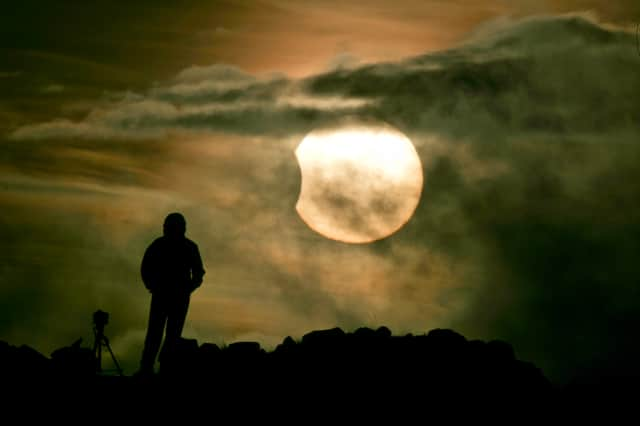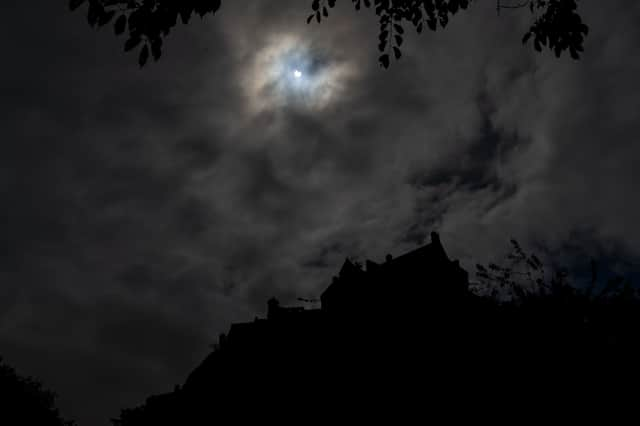Edinburgh set for partial solar eclipse this evening - Everything you need to know
and live on Freeview channel 276
With a total solar eclipse happening over North America on Monday, April 8, Edinburgh residents are expected to be treated to a partial solar eclipse.
The perfect alignment of Earth, the sun and the moon will see people in North America experience a total solar eclipse, which will plunge much of the continent into darkness. But parts of the UK will see a partial eclipse too.
Advertisement
Hide AdAdvertisement
Hide AdPartial solar eclipses are known to make the sun appear to have had a bite taken out of it, because the moon only covers part of the sun rather than the entire thing.


Edinburgh partial eclipse
In Edinburgh, about six per cent of the sun will be obscured at around 8pm on Monday. The partial eclipse is expected to begin at 7.54pm. This the moment the edge of the moon touches the edge of the sun, which is called first contact.
The deepest point of the eclipse, with the sun at its most hidden is known as the maximum eclipse. This is expected to take place above Edinburgh at 8.02pm on Monday. Since the sun is near the horizon at this time, it is recommended that you move to a higher point or find an unobstructed area for the best view of the partial eclipse.
The sun is due to set in Edinburgh at 8.06pm, with the partial eclipse ending at 8.32pm. Seeing this partial eclipse is of course reliant on the weather, so hopefully there will be clear skies above the Capital. However, the Met Office is currently predicting cloud in Edinburgh on Monday evening. Fingers crossed that changes!
Safety
Advertisement
Hide AdAdvertisement
Hide AdThe first rule of a solar eclipse is don't look at the sun without specialised eclipse glasses or a solar viewers. It's not safe. If you look up at the eclipse without protection, it will instantly cause severe eye injury, according to NASA.
The same rule applies for looking at the eclipse through a camera lens, binoculars, telescope or regular sunglasses. According to NASA, the concentrated solar rays will burn through the lens filter and seriously harm your eyes.
What you can use are solar viewers or eclipse glasses that comply with the international standard. These glasses reduce visible sunlight to safe and comfortable levels and block all but a tiny fraction of solar UV and infrared radiation, according to the American Astronomical Society. Eclipse glasses can be purchased online from retailers including Amazon.
Your eyes aren't the only thing you shouldn't point at the sun. Your mobile phone can also be damaged if you point its camera lens at the sun for long periods of time without a special filter.


The rest of the UK
Advertisement
Hide AdAdvertisement
Hide AdIn Glasgow, about 12 per cent of the sun will be obscured. Stornoway will see 33.7 per cent maximum coverage at 8.13pm, the best spot in Scotland to see this solar phenomenon. Here it will start at 7.53pm and end at 8.23pm.
Liverpool will only see a maximum of 3.1 per cent coverage at 7.57pm when the sun is right on the horizon. Belfast will be treated to more of an eclipse with a maximum of 28.1 per cent coverage at 8.10pm - the full window in which people might see it here is 7.55pm until 8.14pm. The south and east of England are expected to miss out on this partial solar eclipse.
Next eclipse in the UK
A partial eclipse will be viewed across 90 per cent of the country in 2026. The next total eclipse won’t be until 2081 in the Channel Islands or 2090 in the south west of the UK.
The last full solar eclipse seen in the UK came in 1999, which was spotted over Cornwall and parts of Devon. Unfortunately, clouds covered it from view in most other areas it should have been spotted over.
Advertisement
Hide AdAdvertisement
Hide AdTotal solar eclipses generally occur every 18 months or so, but whether or not you can see one depends on where you are in the world and, of course, the weather. Partial ones take place between two and five times a year - with the same caveats.
Comment Guidelines
National World encourages reader discussion on our stories. User feedback, insights and back-and-forth exchanges add a rich layer of context to reporting. Please review our Community Guidelines before commenting.
